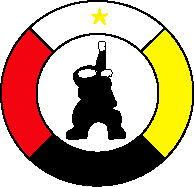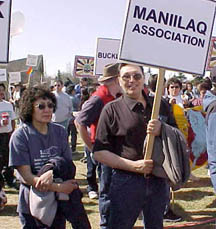|
|
 |
 |
 |
|
A Subsistence Technical-Planning
Meeting - To Protect Traditional-Tribal Life Ways
Purpose:
- To identify issues and concerns in Indian
Country regarding contaminants in Traditional Foods.
- Discuss issues, resources, and gaps concerning
contaminants and how they effect tribal ways of life.
- Share stories, information, and knowledge
to develop a process and structure to protect traditional ways
of life.
Goals:
- To develop recommendations.
- To develop a process for understanding,
naming and defining a tribal way of life/ traditional lifeways/
subsistence, or finding an appropriate term to identify the issue.
- To determine the need for and to plan
for future tribal gatherings
For more information please click
HERE!
Computer-Assisted Translation of Alaska
Native Languages
With the Transnational Arctic and Antarctic
Institute, the ANSC and North Slope Borough are participating in
the design and direction of Inupiaq language software.
Traditional Knowledge Systems in the Arctic
The ANSC convened and facilitated a meeting
with arctic researchers and Native scientists to discuss research
priorities for arctic social science research, begin the planning
for the project and identify a method. Reference manuals and
reports were completed and disseminated. As a follow-up to
this workshop, the ANSC convened and facilitated another meeting
that brought together a diverse group of Native scientists to further
discuss research priorities, intellectual property rights, and the
use of local and traditional knowledge in research agendas.
Contamination of Subsistence Harvest
In collaboration with the University of Alaska
Anchorage and the Institute of Social and Economic Research (ISER),
the ANSC designed and conducted risk assessment surveys to build
a contaminants database that will be used by researchers and communities.
Community-Based Assessment of Traditional
Values
In partnership with Maniilaq, NANA and Northwest
Arctic Borough School District, the ANSC facilitated community discussions
and conducted surveys to provide borough residents an opportunity
to define and discuss their visions of traditional Inupiaq values.
Indigenous People and Ecosystem Management
The ANSC convened and facilitated a workshop
that helped indigenous resource managers from across the circumpolar
North share information on practices, methods and lessons in decision-making
processes involving resource management and environmental assessment.
Northern Native Communities Development
The ANSC collaborated with Alaskan Native
entities to select Alaska and Russian Native participants in a forthcoming
project that will bring together social scientists, Natives and
others from Alaska and Russia.
|
|
 |
 |
 |
|
ANSC UPDATE
Under the National Science Foundation Co-Operative
Agreement, following prior grant contract (1996-1999) with the ANSC
achieved the following results:
- The ANSC has established linkages and communications
throughout Alaska Native communities, state, federal, local and
private agencies, university and educational institutes and Arctic
and Alaskan residents. Linkages range from projects that
focus on local and traditional knowledge (Exxon Valdez Oil Spill
Project, Governorís Office, Minerals Management Service, and the
Bureau of Indian Affairs) to those that center on health issues
(Indian Health Service, Centers for Disease Control, Alaska Department
of Health and Social Services, Southcentral Foundation, Alaska
Native Health Board and National Indian Health).
- The ANSC's Administration and Board of
Commissioners have written the articles of incorporation and by-laws,
developed a policies and procedures manual, and was approved for
the non-profit 501(c)(3) status.
- An organizational network and existing
program information are available, as well as a growing library
of Alaska Native research efforts. A Microsoft ACCESS database
inventory of materials is in progress, including a resource network
of individuals who serve as Native knowledge specialists and consultants.
Specific archival databases are underway to provide inventories
of statewide collections pertaining to traditional knowledge and
materials from the Social Transition in the North project.
- Additional funding support was sought and
secured from federal, Native and private sources. ANSC administered
and collaborated on projects funded through the U.S. Environmental
Protection Agency, the Alaska Humanities Forum, the Northwest
Arctic Borough, the Copper River Native Association, the Alaska
Science and Technology Foundation and the National Oceanic and
Atmospheric Administration.
|
|
 |
 |
|
- ANSC provides a clearinghouse and
remains a means of creating partnerships for circumpolar
indigenous peoples, local communities, researchers, government
and private agencies and educational institutions.
A sampling of our partners include the University of
Alaska system (Anchorage, Fairbanks and Southeast);
statewide Native organizations (Alaska Federation
of Natives, Alaska Tribal Health Consortium); not-for-profit
tribal entities (Copper River Native Association, Rural
Alaska Community Action Program, Northwest Arctic Borough);
species-specific interest groups (Alaska Harbor Seal
Commission, Bering Sea Coalition, Walrus, Nanuuq, Sea Otter,
Whaling); federal and state agencies (U.S. Department
of the Interior, Bureau of Indian Affairs, Alaska Department
of Fish and Game, Alaska Department of Environmental Conservation,
Alaska Department of Health and Social Services, Alaska
Department of Education and Early Development); national/international
organizations (Greenpeace, Nature Conservancy, World
Wildlife Fund); research entities (ARCUS, BASC, Transnational
Arctic and Antarctic Institute, National Oceanic and Atmospheric
Administration); and those involved in sustainable development
(Arctic Council, Governor's Office, Arctic Research Commission,
Northern Forum).
|
|
|
 |
 |
 |
|
- As an advocate for Alaskan Native science,
the ANSC provides leadership, advocacy and vision to assist Native
communities in their development and sustainability by providing
training and technical assistance, connecting research to communities
through sponsorship of community forums and training (example:
developing research methodology training materials and conducting
community training for the Copper River Native Association).
At the international level, the ANSC is collaborating with Alaska
Native entities to review materials and bring together social
scientists, Natives from Alaska and Russia in an effort entitled,
Northern Native Communities Development.
- The Science Advisory Group for the Social
Transition in the North project was created in order to assist
the ANSC in setting the direction, budget and timeline for the
completion of this project. Year Three field research was
completed in Chukotka, archiving project continues, final review
and future of data/archives is in progress.
- The ANSC recently completed the first year
of regional meetings, which employed Native protocols to document
traditional knowledge held by Native experts. An important
goal of these meetings is to identify internal community and regional
protocols so that there are specific guidelines for research in
each community.
|
|
|

